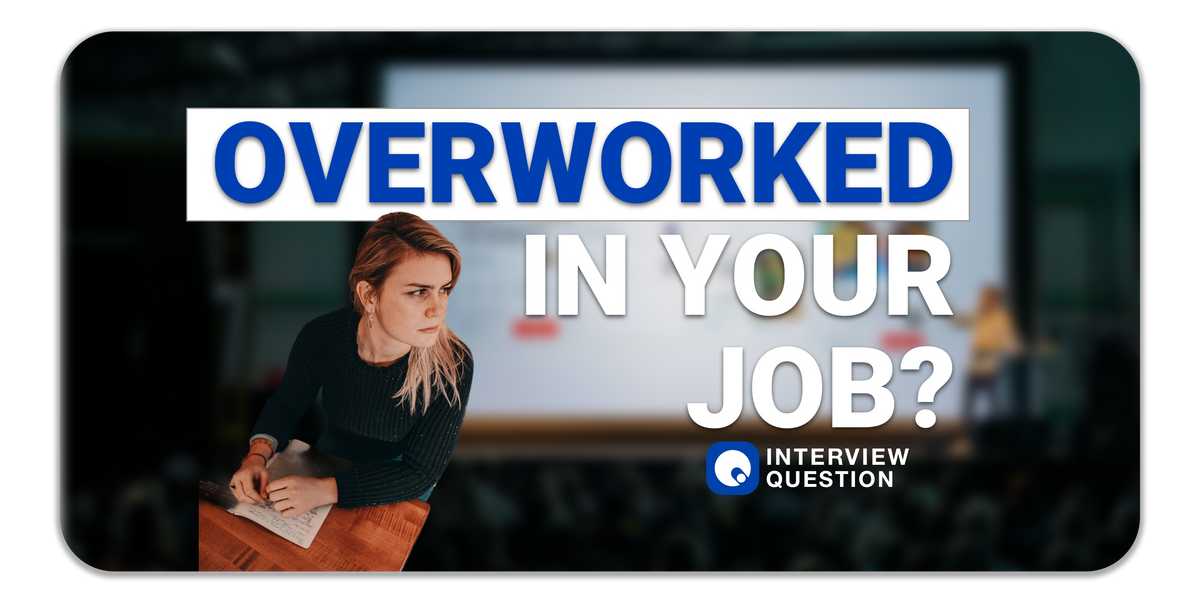How to React to An Overworked Job
In 2019 and 2021, being burnt out is the number 1 reason why employees voluntarily resign. The experience of being exhausted emotionally drained and completely demotivated by your work is painful.

In 2019 and 2021, being burnt out is the number 1 reason why employees voluntarily resign. The experience of being exhausted emotionally drained and completely demotivated by your work is painful. Overworking can be caused by a combination of factors such as long hours, unbalanced workloads, and poor leadership. If your management does not do anything to change your situation, there are ways to keep sane yet professionally motivated.

Not About Money
The common advice is to ask your boss to give you a raise so you can feel compensated for the injustice you have tolerated. However, if you're overworked, having more money in your pocket will not stop the workload from piling up.
Additionally, it is difficult to think calmly and concentrate on salary negotiations when you are stressed. Saying the wrong things may end up in you losing your job. Like feeding petrol to a baby, compensation will not solve the issue of being overworked as it is the wrong solution to the right problem.


Level With The Bosses' Demands
Despite the fact that you are not a workhorse, you still have the obligation to perform your best at volume. To what kind of volume and whether this work volume is 1) agreed upon, and 2) reasonable can be discussed.
- Prepare a list of work you were tasked to do in the past week or month.
- Then, include this list with supporting emails of the requirements and expectations.
- Also include evidence of your delivered work (what you could and could not complete)
Bringing these documents to a discussion with your superior allows both sides to determine if your claim of being overworked is valid. These are your bullets to the gunfight.
Should you prevail, then propose your acceptable workload to your boss. At the same time, you may want to recalibrate your yearly career targets so you are able to retain some or all of your bonus compensation as well.

If you fail to get through with your boss, consult a second opinion from a career coach. Get her perspective - her experience with other employees can help you get a better sense of where you could be headed and highlight any potential roadblocks to you early.

Determine if Overworking is a Company Culture
Toxic work environments are extremely harmful to our physical and mental health. Try checking with colleagues in other departments and offices if your unfavorable experience is consistent company-wide. This check makes sure that you were not specifically targeted or discriminated against.
You may reserve rights to take action if such nonconformant activity is not rectified. It is very important that you hire lawyers or other employment experts if you have been discriminated against on the basis of your age, gender, race, sexual orientation, religion or other status protected under the law. Finding an experienced attorney or laywer who can help you win your case is very critical as well as doing so sooner rather than later.

Temporary Workload Increase
Sometimes, the problem is temporary - maybe the issue is seasonal or there is a recent large client. Key people in your organisation may have left and HR is facing a manpower shortage. Everyone has to put extra hours or extra effort. These kinds of problems are transitory and can be seen as good problems because if you are able to stick through the difficult times with the company, then you are a valuable employee to keep.

Overstretched Your Career Goals
You may have set a yearly target that in your current state, is not achievable. You may not have the skills or experience to cope with such workload, thus you became overworked. This burnout you feel may be partly due to your unrealistic expectations. You may have set a goal for your career that's too big and you cannot achieve in your current position. If so, then consider setting smaller and achievable goals: e.g. "I want to get promoted in 2 years instead of 6 months".

Reporting Dissatisfaction Upwards In the Organisation
Overworking may not be resolved by your boss if the issue is a norm. In companies where overwork is prevalent, you should further identify whether your workplace has a trustworthiness culture both in terms of having transparent information and a safety council. Make anonymous reports where possible.

Reporting Dissatisfaction to a Union, Watchdog Organisations or to Government Bodies
Warning! Whistleblowing should be done with caution since it invites a fallout with your employer. Generally, external reports are only advisable when all avenues to address the issue within the organization have been exhausted. Giving internal information and accusing your employer of certain non-actions can be disastrous in your career (i.e. your NEXT employer may not hire you).
Worker's union may act if you are unionized and if there are a number of complainants. Watchdogs can make shameful practices public to push for change. Finally, government bodies may choose to probe, investigate and thereafter prosecute errant employers who overwork their staff beyond contractual hours should they be found to flout the law. Having third parties step into what essentially is a "family argument" may cause the family to disband and be in long-term disagreement. Trying to mediate in-house is generally a better solution compare to reporting dissatisfaction to outside parties.

